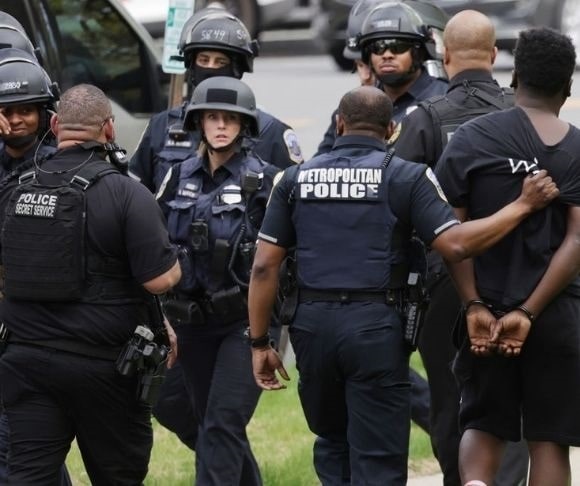
(Photo by Kevin Dietsch/Getty Images)
Have conservatives given up on criminal justice reform? When former President Donald Trump became the cheerleader for the First Step Act in 2018, the Republican base was ecstatic about the idea of the right leading the charge to make much-needed changes to how America does criminal justice. But now, four years later, nary a mention of reform can be found among conservatives, who are focused on skyrocketing crime rates and the faulty Democratic policies which caused them.
The First Step Act was touted as one of President Trump’s most significant bipartisan accomplishments. It was largely viewed as a sea change in the Republican Party, which typically eschewed the notion that the nation’s justice system needed fixing. At the time, it seemed the party was moving out of the 1980s mentality and into a time when they could address flaws in the system while still maintaining a “Law and Order” stance.
However, in 2022, amid rising concerns about crime rates, the GOP is focused on highlighting the importance of a tough approach to violent offenses. As Democrats and progressive activists pushed a “Defund the Police” campaign after the murder of George Floyd, conservatives pointed out that this approach would only lead to more crime. Now, President Joe Biden and Democratic members of Congress have attempted to distance themselves from such radical crime policies and are trying to convince the public that they are sincere in the effort to decrease illegal activity.
Nevertheless, Republicans smelled blood in the water and recognized crime as one of the Democrats’ most vulnerable weak spots and have exploited it accordingly. Instead of discussing the next “step” in revamping the justice system, Republicans have identified crime as an issue that can help their candidates get elected.
There are still many on the right who wish to see the criminal justice issue become part of the party’s platform again and are disturbed by the fact that the problem is fallen out of the spotlight. They fear it will lead to the GOP abandoning the issue altogether. Brett Tolman from Right on Crime, a conservative justice reform group, told Politico: “I personally think there’s just as many people that want to do criminal justice reform as the last several years, but I think their voices are quiet now, and those that are opposed to the First Step Act are still opposed and have gotten louder.”
Tolman appears not to have lost hope and suggested there are individuals still working under the radar to push the party in the right direction. “It feels like we just have to bide our time a bit and get past when the emotion of all of the political rhetoric is at the forefront,” he said.

Pastor Darrell Scott (Photo by Michael Reynolds – Pool/Getty Images)
Pastor Darrell Scott, a longtime friend of the former president, acknowledged that Republicans are wary of discussing reforms as midterm campaigns are in full swing. “There’s a lot of polarization there and with this being an election year, [Republicans] are treading carefully on what they want to comment on and what they want to be silent on,” Scott told Politico.
However, the rising crime rates are becoming more of a priority for American voters at the moment. With record homicide rates in 12 major cities last year, it is not difficult to see why the GOP might not be as focused on reforming the justice system. Even further, progressive politicians are making the situation worse by instituting bail reform measures that do more to protect violent criminals than law-abiding civilians. This has given Republicans yet another vulnerability to exploit.
The First Step Act was viewed favorably by Americans on both sides of the political divide. While some argued it did not go far enough to deal with inequalities in the justice system, others emphasized that it was only the beginning of the initiative to create a better way of doing things. It shortened sentences for nonviolent drug offenders and improved conditions for those incarcerated in federal prisons, among other reforms.
Still, it might not be time to count out Republican efforts to address criminal justice. It is possible the party could be persuaded to take up the issue again if they retake Congress in 2022 and even the White House in 2024. The conversation seems to be on pause currently – but when crime rates decrease, it could very well open up again in the future.
Remember to check out the web’s best conservative news aggregator
Whatfinger.com — the #1 Alternative to the Drudge

